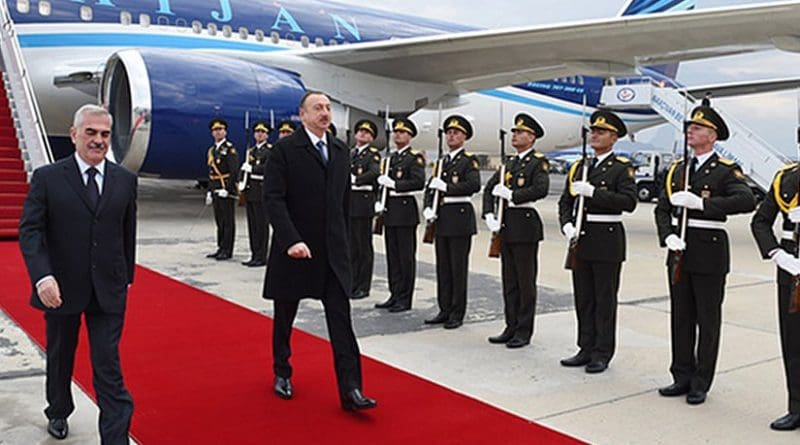Azerbaijan: Ilham Aliyev’s Political Ploy – OpEd
As might be expected the political intrigue created by the decision of the President of Azerbaijan Ilham Aliyev to postpone the elections from October to April has two components: domestic and foreign policy.
One could also distinguish two components in the foreign policy component. The first is the attitude of the leading world players to the fact of the transfer of presidential elections and the nomination of Aliyev for a fourth term. In this regard, many observers note that the US in its official reaction to the upcoming events, has limited itself to calling on the Azerbaijani authorities to act within the framework of the current constitution. In fact it means that they acknowledge the transfer of elections and nomination for the fourth term.
It is obvious that the priority of the Trump Administration in the world and in the post-Soviet space will be the U.S. geopolitical interests, and while choosing partners for cooperation he will not be guided by the presence or absence of the level of democracy, or the protection of certain declared principles, as it was before.
Russia’s traditionally restrained reaction to the postponement of the election and the presidential nomination of Ilham Aliyev shows that President Vladimir Putin is satisfied with the way Aliyev demonstrates his readiness to take into account Russia’s interests in the region.
And, of course, the second but the most important issue on the foreign policy agenda of Azerbaijan is the situation of the Armenian-Azerbaijani conflict. Today we cannot unfortunately estimate the situation of the conflict only by the negotiation process intensity. The public of Armenia and Azerbaijan consider that these negotiations are ineffective. And the rounds of negotiations cause mockery over participants, both in a press, and in social media.
Therefore, it is difficult to assume that the negotiation process in this format (with the previous participants, both in terms of propaganda and effectiveness) will be successful after the presidential election campaigns in Azerbaijan, Russia and the elections of the Prime Minister in Armenia.
As for the internal political situation in Azerbaijan after the postponement of the elections in the country the influence of the West on the situation in the country has been exposed by opposition parties and movements.
If the opposition party seeks to come to power by constitutional means, it must constantly work with the electorate. Opposition parties Musavat and Umid as well as the Azerbaijani Popular Front (APF) and the National Council of Democratic Forces (NCDF) refused to participate in the presidential elections on April 11. Moreover, the last two parties called for a boycott of the presidential elections and planned some protests in the near future. This confirms the idea that some opposition forces in Baku were waiting for support of the West, and the leadership of the republic broke simply their plans.
Should those candidates for the presidency of Azerbaijan who will take part in elections be afraid of boycotting the election campaign by the opposition parties?
As far as I know in any country boycotts of election campaigns by any parties did not affect the results of the ballot.
It’s another matter that the opposition parties often become the source of stovepiping of the most unpleasant information about the representatives of the ruling party during the election campaigns.
Today in Azerbaijan we are witnessing compromising information “leaks” about certain high-ranking officials and just fake news aimed at undermining the reputation of the authorities and individual candidates. Azerbaijan is not protected from the influence of some media and political technologists carrying out orders of their “employers”.
According to the well-known Azerbaijani political scientist, Adgezal Mamedov, foreign political technologists work today in all post-Soviet countries and at all elections without exception. Their goal is the political destabilization of traditional societies and the introduction of turmoil into the ranks of nationally-oriented elites in favor of various destructive political forces that cover their dependence on foreign political centers with beautiful slogans.
However, the parties boycotting the elections are always in the minority. Moreover, they split the critics of the authorities into a systemic opposition and an irreconcilable opposition, thereby increasing the chances of candidates from the ruling party or allied parties to be elected. So, since the opposition parties announced of their boycott of presidential elections in Azerbaijan, voters should forgot about these parties – at least until the end of the election campaign.
In this sense, a number of the opposition parties mentioned before made a strategic mistake refusing to participate in the presidential elections.
Meanwhile, a holy place is never empty. So, the parties Modern Musavat, the Azerbaijani Popular Front Party (APFP), and the Liberal-Democratic Party have already announced their intention to participate in the presidential elections on April 11. Several candidates have also been nominated by initiative groups. So, elections in the country will be alternative in any case.
The participants of the forthcoming campaign are determined. Predictions about the future results of the presidential elections will certainly appear in the press. Although no one in Azerbaijan doubts today that the current president of the republic will win.

